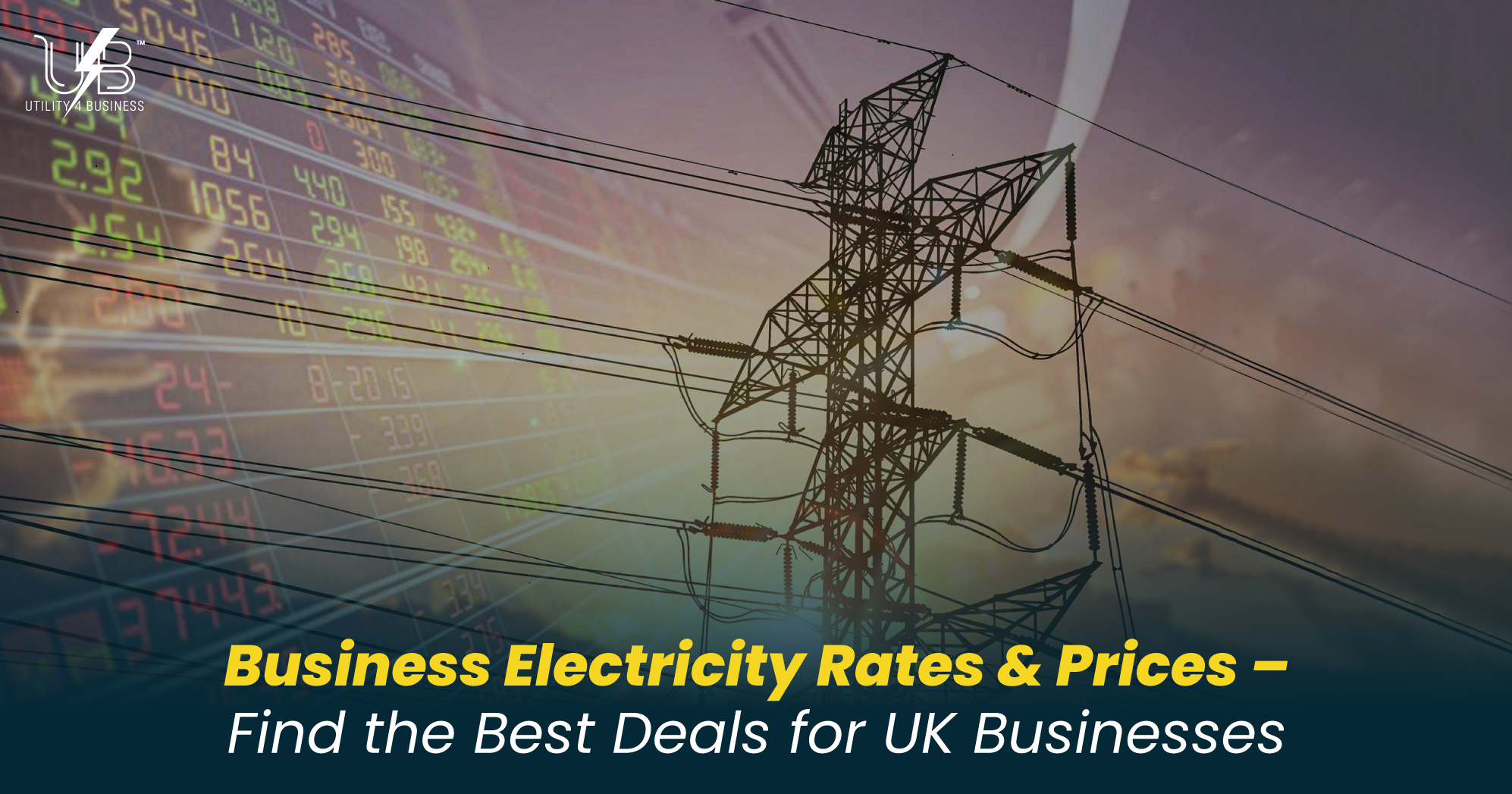Best Business Energy Suppliers and Tariffs Explained
Compare UK Business Energy Tariffs

Choosing the right business energy supplier and tariff shapes your cost base and cash flow. Prices move with wholesale markets, network charges, and policy costs. There is no price cap for business energy in the UK, so your contract, usage profile, meter type, and timing have a direct impact on the rates you pay. In this guide, Utility4Business explains how business energy suppliers price contracts, what sits inside business energy tariffs, and how to select options that fit your operations. We also show where businesses lose money through avoidable mistakes and how a structured business electricity comparison avoids them.
Our goal is simple. Give you clear, practical steps that help you buy with confidence. We keep the language professional and straightforward, avoid jargon, and focus on actions that any business can take today.
How The UK Business Energy Market Works
The market starts with wholesale trading, where generators sell electricity and producers sell gas. Suppliers purchase energy from these markets and then recover network costs, policy costs, metering costs, and operating expenses through the bills they issue to customers. Because there is no cap on business energy prices, retail quotes track market levels and non-energy charges more closely than household bills do. That is why timing and contract structure matter so much.
Non-energy costs include transmission and distribution network charges, system balancing costs, environmental and social obligation costs, and metering. In recent years, reforms have moved more of these costs into fixed charges. You now see a larger standing charge on many quotes, while the unit rate may look lower. Understanding this balance helps you compare contracts on a true like-for-like basis.
Tariff Building Blocks You Actually Pay
A business electricity or gas quote breaks down into a few headline items. You should recognise each of them and check how they behave over the term.
- Unit Rate (p/kWh): The price per kilowatt-hour for the energy you use.
- Standing Charge (p/day or £/day): A fixed daily amount that covers network, metering, and some policy costs.
- Contract Type: Fixed, variable, tracker, pass-through, time-of-use, or flexible (for high-usage sites).
- Third-Party Charges: Items like network, balancing, and certain policy costs. These may be included in a single fixed price or passed through separately on some tariffs.
- VAT and Levies: VAT and the Climate Change Levy (CCL) apply on top in most cases, subject to eligibility and exemptions.
When you review offers, build a 12-month total-cost view that combines unit rate, standing charge, expected consumption, VAT, and CCL. Utility4Business presents this as standard during business electricity comparisons, so you can make a direct decision.
The Main Business Energy Tariff Types
Fixed
A fixed contract sets the unit rate and standing charge for a defined term. Your total bill still moves with usage, but your per-unit and per-day price stay consistent, which supports budgeting. Many micro and SME sites prefer fixed terms between 12 and 36 months.
Variable Or Deemed
When a contract ends without a new agreement, you move to a variable or “deemed” rate. These rates are often higher because the supplier carries more risk. Avoid them. Renew on time or switch to a business electricity price comparison before the expiry date.
Tracker
A tracker follows wholesale indices. You pay less when the market falls and more when it rises. This approach suits buyers who follow markets closely and accept price movement during the term.
Pass-Through
On pass-through tariffs, the supplier may fix the energy component but charge certain non-energy costs at cost as they change over time. These deals suit larger users who want visibility of each cost line and can manage some volatility.
Time-Of-Use (ToU)
ToU tariffs price energy by time band. If you can shift the load to cheaper hours, you cut your blended rate. Half-hourly data unlocks the best results because it shows exactly when you consume power.
Flexible (For Larger Users)
Large and multi-site organisations sometimes buy flexibly through a risk-managed strategy. This spreads market timing and can lower the long-run average, but it needs governance, reporting, and clear decision rules.
Microbusiness And Small Business Rules That Matter
Protections exist for smaller firms. Microbusinesses must receive clear contract information, better renewal visibility, and limits on automatic rollovers. Recent updates introduced a “small business” grouping for certain protections as well. In practice, this means you should receive clearer terms and faster switching, but you still need to manage dates and documentation. Keep annual usage, meter details, and end dates in one place. Utility4Business sets reminders and prepares quotes well before renewal so you avoid expensive default rates.
VAT, De Minimis, And Climate Change Levy (CCL)
Most businesses pay 20% VAT on energy. Some meters qualify for the 5% reduced rate under the de minimis rules based on low consumption. Certain charities and not-for-profits may also qualify for reduced VAT on eligible use. CCL applies to most non-domestic energy consumption, but exemptions and discounts exist, including reliefs for businesses that sign Climate Change Agreements and meet efficiency targets.
Action for you: confirm VAT rate per meter and check CCL eligibility. Submit the correct declarations to your supplier. During business electricity comparisons, we check these items because we often find sites charged at the wrong rate.
Network Charging Reforms And Standing Charges
Reforms in network charging have pushed a larger share of system costs into standing charges. As a result, the daily charge now carries more weight in your total cost than it did in the past. When you compare offers, do not chase the lowest p/kWh in isolation. Review the complete picture. A higher standing charge can cancel out a lower unit rate if your usage is modest, while a very low standing charge may not offset a steep unit rate if you consume heavily at peak times.
Metering And Data: The Hidden Lever
Your meter affects both the tariff types you can access and the price you pay.
- Profiled Meters (Smaller Sites): Billed on industry profiles. Simple, but fewer options for ToU pricing.
- AMR/Smart Meters: Improve billing accuracy and unlock basic ToU benefits.
- Half-Hourly (HH) Meters: Capture consumption every 30 minutes. Required above certain load levels and essential for advanced ToU and demand-side optimisation.
High-quality interval data builds supplier confidence and can reduce risk premiums in your price. Utility4Business uses this data to model your load shape and negotiate sharper quotes with business electricity suppliers.
Green Energy And REGOs
Many suppliers offer renewable electricity backed by certificates. A genuine green tariff comes with proof of origin for the electricity supplied. The premium for green energy can vary with certificate costs and market conditions. If sustainability reporting matters to your brand or supply chain, tell us at the start. We include green options in your compare business electricity rates exercise and confirm certificate backing in the final paperwork.
What “Best Supplier” Really Means
There is no single best supplier for every business. The right supplier is the one that fits your load shape, metering, credit profile, contract priorities, and operational plans at the time you buy. A warehouse with a steady base-load and a half-hourly meter needs a different approach from a small office with a profiled meter and seasonal peaks. Utility4Business runs business electricity comparisons across the market and presents a shortlist with a clear explanation of trade-offs so you can decide with confidence.
Practical Buying Checklist
- Collect Your Data: Recent bills, MPAN/MPRN, annual kWh, meter type, and contract end date.
- Define Your Goal: Certainty, flexibility, green supply, or ToU optimisation.
- Choose Contract Length: Common terms are 12–36 months. Match the term to your plans.
- Pick Tariff Type: Fixed for budget control; pass-through or ToU if you can manage load.
- Check VAT and CCL: Confirm eligibility and submit declarations where needed.
- Compare Total Cost: Combine standing charge, unit rate, VAT, and CCL for a 12-month view.
- Avoid Deemed Rates: Renew or switch before expiry.
- Consider Load Shifting: If you can move consumption, model ToU savings.
- Align With Site Plans: If you will move premises or add sites, reflect that in term length.
- Document Decisions: Keep quotes, assumptions, and approvals on file for audit and renewal.
Utility4Business prepares this end-to-end and highlights risks before you sign.
Business Energy Tariffs In Depth
Fixed Vs Pass-Through
A fixed tariff offers stable pricing per unit and per day. You still pay for what you use, but you lock in price points. It simplifies budgeting and suits most small to medium sites. A pass-through tariff may offer a leaner energy-only price but exposes you to movement in non-energy costs. This works when you want transparency, can handle reporting, and accept some volatility.
Time-Of-Use And Demand Shaping
Time-of-use pricing rewards off-peak consumption. If you operate refrigeration, EV fleets, or batch processing, you can schedule to cheaper hours. The savings add up when you commit across the term. Utility4Business can model scenarios during business electricity comparisons so you see the blended effect before you choose a tariff.
Multi-Site And Portfolio Buying
Multi-site groups can buy together and gain scale. This approach simplifies admin and enables a structured risk strategy. You can also align contract end dates across sites to reduce fragmented renewals.
VAT And CCL
Imagine a small charitable site with modest electricity use at a single meter. Because consumption sits below the de minimis threshold, that meter may qualify for the 5% VAT rate rather than 20%. If the organisation meets conditions for CCL relief, that levy may not apply to eligible consumption. The annual saving looks small on a single bill but become material over a multi-year term. Many sites miss this because no one checks each meter on its own. Utility4Business reviews VAT and CCL status as part of every business electricity comparison we complete.
Common Pitfalls And How To Avoid Them
Letting Contracts Lapse
The easiest way to pay more is to fall onto a deemed rate. Set alerts for renewal and gather quotes early.
Comparing Only The Unit Rate
A low p/kWh can hide a high standing charge. Always compare the total 12-month cost for a realistic picture.
Ignoring VAT And CCL Status
Wrong VAT or missed CCL relief costs money every month. Check eligibility and keep declarations current.
Poor Meter Data
Estimates lead to confusion and disputes. Smart or half-hourly reads improve accuracy and pricing.
Mismatched Contract Length
If you plan a move or expansion, do not lock into a long-term commitment without flexibility. Align the term with your business plan.
Assuming A Universal “Best Supplier”
Prices and terms change across time and by profile. Test the market each renewal and document why you chose the final offer.
How Utility4Business Helps
Utility4Business supports UK businesses that want a clean, professional process and a clear outcome. We collect your data once, check VAT and CCL status, and run business electricity comparisons across the market. We present a short, readable summary that shows total annual cost, contract features, and renewal dates. We can model time-of-use scenarios, review metering options, and include renewable electricity offers when required. If you also want to review related Business Insurance Plans for operational risks linked to energy usage—such as equipment breakdown or business interruption—we can point you to trusted partners while we handle the energy piece end-to-end.
Step-By-Step Process To Secure A Strong Deal
- Start 6–12 Weeks Before Renewal: Leave room to time the market and resolve any data issues.
- Scope Your Objectives: Certainty, flexibility, green credentials, or load-shifting gains.
- Share Bills And Meter Details: MPAN/MPRN, annual kWh, meter type, and contract end date.
- Run Business Electricity Comparisons: Fixed, pass-through, and ToU options, all on a like-for-like cost view.
- Check Terms Carefully: Termination, change-of-tenancy, deposits, and billing preferences.
- Confirm VAT and CCL: Complete any declarations before the contract goes live.
- Select and Sign: Keep a clear record of the decision and set reminders for mid-term reviews.
- Monitor And Optimise: Use smart or half-hourly data to track consumption, spot waste, and adjust operations.
Conclusion
There is no single answer to which supplier is best. The right choice depends on your usage profile, metering, contract priorities, and market timing. Understand the building blocks of a tariff, check VAT and CCL status, and always compare total cost rather than unit rate alone. Review the balance between standing charge and unit rate, consider time-of-use opportunities, and align the contract term with your plans. With a structured process and clear data, you can secure a contract that supports your budget and operations.
Utility4Business makes this simple. Share your latest bill and contract end date, and we will prepare a concise business electricity comparison with options that match your goals. You stay in control, and you make the decision with clarity.
Find This Article Helpful? Share It Now!
At Utility4Business, we offer top-notch customer support and business utility solutions for businesses across the UK. Consider sharing this article and helping others discover how our expertise can add value to their business success.

Read Our Latest Posts
Explore our latest blog posts and learn how Utility4Business can support your business growth with tailored utility solutions and services. Stay ahead of the curve with the latest information from industry experts and take advantage of our user-friendly comparison services to find the best business deals.


Get Connected
At Utility4Business, our team of experts can help you figure out the highest-value business utility deals that will help your business grow over time.


